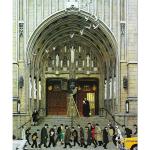
Some people want the Bible to be untrue. Mmm, scratch that. Some people desperately want the Bible to be untrue. This desire can manifest in a number of ways, including finding ways of explaining scriptural accounts that undermine the witness of the text.
One of my favorite examples of this is the scholar who announced in 2002 that the visions of the prophet Ezekiel were the product of epilepsy, not the revelation of God. Can’t be divine, so it must be . . . a disorder . . . yeah, that’s the ticket.
A more recent example comes from a study by a researcher who claims angelic encounters in the Scripture were the product of mere imagination, the result of “lucid dreaming.” As told in 1 Kings, the prophet Elijah had an encounter with an angel who woke him from sleep to comfort and feed him. Study participants in dream states were capable of reproducing aspects of this scene, supposedly demonstrating that Elijah’s angel was more figment than friend.
When dreams come true
The skeptical logic make sense. If the events of the story can be attributed to a delusion of sleep, we’re free to dismiss them — a conclusion that might apply to more than just the story of Elijah. After all, lots of angelic encounters in the Bible happen during sleep.
For instance, Acts tells us the story of the apostle Peter asleep in prison when an angel woke and freed him. As if to affirm the idea that dreams equate to delusion, Peter thought he was dreaming; that is to say, he thought the events weren’t happening to him. But here’s where the story goes awry from the perspective of the study. Peter thought he was dreaming until the moment he realized he was actually free of his bonds and well beyond the precincts of the prison.
The patriarch Jacob had encounters with angels that were described as dreams. First, when he slept and saw angels transversing a ladder between heaven and earth. Later when an angel spoke to him in his sleep and provided direction about returning to his home. But Jacob also had a wrestling bout with an angel and was in fact wounded. Bede’s Ecclesiastical History similarly tells the story of an Irish monk named Fursey who was lifted by angels in a dream through an aerial conflagration. Fursey woke with burns. It takes something beyond “lucid dreaming” to explain these encounters. Dreams do not injure.
Neither are dreams shared, but sometimes angelic encounters are portrayed as events in which more than one person participated. The three youths in the fiery furnace come to mind. So does Elisha’s vision of the celestial army, a vision that Elisha’s servant also saw.
Angels speaking
This isn’t to suggest that angelic encounters do not happen in simple dreams. As in the case of Jacob, Scripture describes several instances of angels speaking through dreams. An angel spoke to Mary’s husband Joseph in dreams three different times. But in every instance the communication is assumed to be real, not a figment.
And why not? The tradition describes angels as (to use the technical language) noetic or spiritual beings; surely we can believe they are able to speak to the nous (the mind) or spirit in whatever state is optimal, including dreams.
But note that several other encounters in the Scripture happened during waking hours. Gideon was threshing grain. Zechariah was praying in the temple. Mary was weaving a new veil for the temple. The assumption is that these were actual occurrences, not delusions, and the contexts preclude attribution to mere dreams.
A bigger world
To say that angelic encounters are all in people’s heads only serves a naturalist/materialist worldview that precludes belief in the spiritual. But this is an impoverished worldview, far from the vision of the world that God provides in his Word and the church — and one that frankly doesn’t add up.
Christians should reflect on how far their own thinking denudes the spiritual landscape. Some of us rarely contemplate angels, and we make virtually no room for them in our spirituality. Perhaps we disagree with the ways in which fellow believers of other traditions treat angels. Perhaps some of us have bought aspects of the materialist worldview and don’t give them much credence. Either way, we’ve accepted a smaller world than the one God offers us.
Better to see it as the Scripture and the church always have: That our world is both material and spiritual. In City of God Augustine spoke of it as a shared city that people and angles both inhabit. As the church has historically seen it, angels are not figments. They are neighbors who take great interest in helping us on our journey to Christ.
















